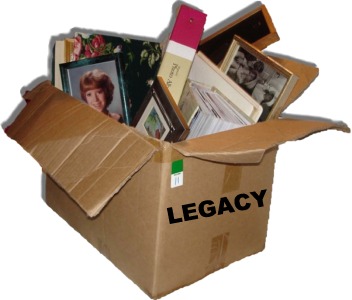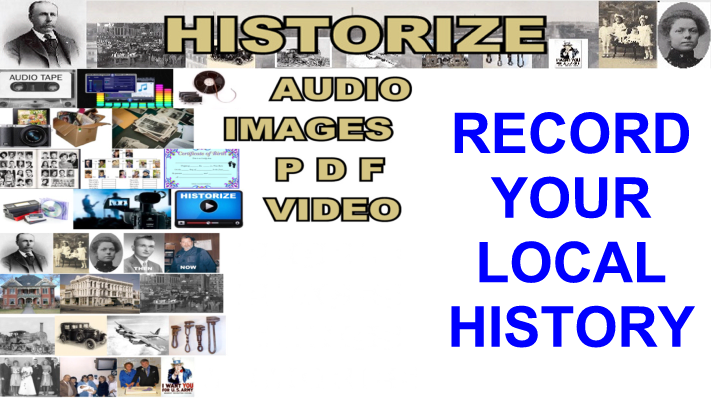


We will never know the personal dramas of any of our ancestors.
And while we will never know what it was like to have a hard day we will never know the joys and the achievements they experienced either.
Use your collection of photos - slides - audio - video - documents to HistoriZe your heritage.
Someone did a lot of work to accumulate history for an obituary or celebration of life. HistoriZe it.
Use your smart phone to scan old school, church and military yearbooks
Use your smart phone to HistoriZe a grave site. Talk about what you know of that person and make it a video.
Or better yet HistoriZe the whole cemetary. Find a sponsor to help pay for your time and effort.
Search for more information on your ancestor's occupation to include when HistoriZing
Get Prepped
Start at your local library. Even if you're only investigating a person, and not an entire family tree, there are many great books on genealogy with useful research information. Birth and death records are a great place to start searching. You can find where to send your requests for birth, death or marriage information online, or may complete the search yourself at the municipal archive. You may learn a lot just from basic documents such as the birth, death and marriage records. Be open minded to the idea that your name may have been spelled differently in the past, or your birthday and your parent's wedding date turn out to be only six months apart. Search out local historians and the local historical and genealogical societies. They often have an encyclopedic knowledge of local history (or know the person who does). They can provide clues and insights you never dreamed of.
Get Researching
Know the history of the time you're researching. An understanding of local culture and climate can offer many clues as to your ancestor's experience. The census for the years 1790-1930 are available for research purposes. The National Archives has detailed instructions on how to best do a census search. Read up online, then find where the microfilmed records are located nearest to you. In order to do a search, you must know the state, county and town of the person you're researching. You must also know the surname of the head of the household. The National Archive has an online listing of National Archive centers near you. While these holdings may be more limited than the Washington, D.C. headquarters, regional archives are also great sources for local information. When you know a little, you can find out a lot: there are bankruptcy files to review, court files, homestead land grants, shipping lists and veteran's information, just to mention a few of the options. Consider joining a local genealogical society if your research is localized. They'll have good tips and a great understanding of the records available. Many archive facilities offer genealogy research workshops.
To find previous owners you can check with your county clerk for parcel records on your property.
To see what your house, land, or neighborhood looked like, tryUse your collection of photos - slides - audio - video - documents to HistoriZe your place.
Use your smart phone document now and to scan old photos and documents.
Use your smart phone to HistoriZe a grave site. Talk about what you know of that person and make it a video.
Or better yet HistoriZe the whole cemetary. Find a sponsor to help pay for your time and effort.
Get Prepped
Start at your local library. Even if you're only investigating a person, and not an entire family tree, there are many great books on genealogy with useful research information. Birth and death records are a great place to start searching. You can find where to send your requests for birth, death or marriage information online, or may complete the search yourself at the municipal archive. You may learn a lot just from basic documents such as the birth, death and marriage records. Be open minded to the idea that your name may have been spelled differently in the past, or your birthday and your parent's wedding date turn out to be only six months apart. Search out local historians and the local historical and genealogical societies. They often have an encyclopedic knowledge of local history (or know the person who does). They can provide clues and insights you never dreamed of.
Get Researching
Know the history of the time you're researching. An understanding of local culture and climate can offer many clues as to your ancestor's experience. The census for the years 1790-1930 are available for research purposes. The National Archives has detailed instructions on how to best do a census search. Read up online, then find where the microfilmed records are located nearest to you. In order to do a search, you must know the state, county and town of the person you're researching. You must also know the surname of the head of the household. The National Archive has an online listing of National Archive centers near you. While these holdings may be more limited than the Washington, D.C. headquarters, regional archives are also great sources for local information. When you know a little, you can find out a lot: there are bankruptcy files to review, court files, homestead land grants, shipping lists and veteran's information, just to mention a few of the options. Consider joining a local genealogical society if your research is localized. They'll have good tips and a great understanding of the records available. Many archive facilities offer genealogy research workshops.
History isn't only what you read in school books. A lot of the stuff you use in your daily lives have really rich histories themselves. And, sometimes, those histories are way, way more interesting than what you'll read about in history class.
Use your collection of photos - slides - audio - video - documents to HistoriZe your family past memories.
Here are some other linksGet Prepped
Start at your local library. Even if you're only investigating a person, and not an entire family tree, there are many great books on genealogy with useful research information. Birth and death records are a great place to start searching. You can find where to send your requests for birth, death or marriage information online, or may complete the search yourself at the municipal archive. You may learn a lot just from basic documents such as the birth, death and marriage records. Be open minded to the idea that your name may have been spelled differently in the past, or your birthday and your parent's wedding date turn out to be only six months apart. Search out local historians and the local historical and genealogical societies. They often have an encyclopedic knowledge of local history (or know the person who does). They can provide clues and insights you never dreamed of.
Get Researching
Know the history of the time you're researching. An understanding of local culture and climate can offer many clues as to your ancestor's experience. The census for the years 1790-1930 are available for research purposes. The National Archives has detailed instructions on how to best do a census search. Read up online, then find where the microfilmed records are located nearest to you. In order to do a search, you must know the state, county and town of the person you're researching. You must also know the surname of the head of the household. The National Archive has an online listing of National Archive centers near you. While these holdings may be more limited than the Washington, D.C. headquarters, regional archives are also great sources for local information. When you know a little, you can find out a lot: there are bankruptcy files to review, court files, homestead land grants, shipping lists and veteran's information, just to mention a few of the options. Consider joining a local genealogical society if your research is localized. They'll have good tips and a great understanding of the records available. Many archive facilities offer genealogy research workshops.
History isn't only what you read in school books. A lot of the stuff you use in your daily lives have really rich histories themselves. And, sometimes, those histories are way, way more interesting than what you'll read about in history class.
Use your collection of photos - slides - audio - video - documents to HistoriZe your things.
Get Prepped
Start at your local library. Even if you're only investigating a person, and not an entire family tree, there are many great books on genealogy with useful research information. Birth and death records are a great place to start searching. You can find where to send your requests for birth, death or marriage information online, or may complete the search yourself at the municipal archive. You may learn a lot just from basic documents such as the birth, death and marriage records. Be open minded to the idea that your name may have been spelled differently in the past, or your birthday and your parent's wedding date turn out to be only six months apart. Search out local historians and the local historical and genealogical societies. They often have an encyclopedic knowledge of local history (or know the person who does). They can provide clues and insights you never dreamed of.
Get Researching
Know the history of the time you're researching. An understanding of local culture and climate can offer many clues as to your ancestor's experience. The census for the years 1790-1930 are available for research purposes. The National Archives has detailed instructions on how to best do a census search. Read up online, then find where the microfilmed records are located nearest to you. In order to do a search, you must know the state, county and town of the person you're researching. You must also know the surname of the head of the household. The National Archive has an online listing of National Archive centers near you. While these holdings may be more limited than the Washington, D.C. headquarters, regional archives are also great sources for local information. When you know a little, you can find out a lot: there are bankruptcy files to review, court files, homestead land grants, shipping lists and veteran's information, just to mention a few of the options. Consider joining a local genealogical society if your research is localized. They'll have good tips and a great understanding of the records available. Many archive facilities offer genealogy research workshops.